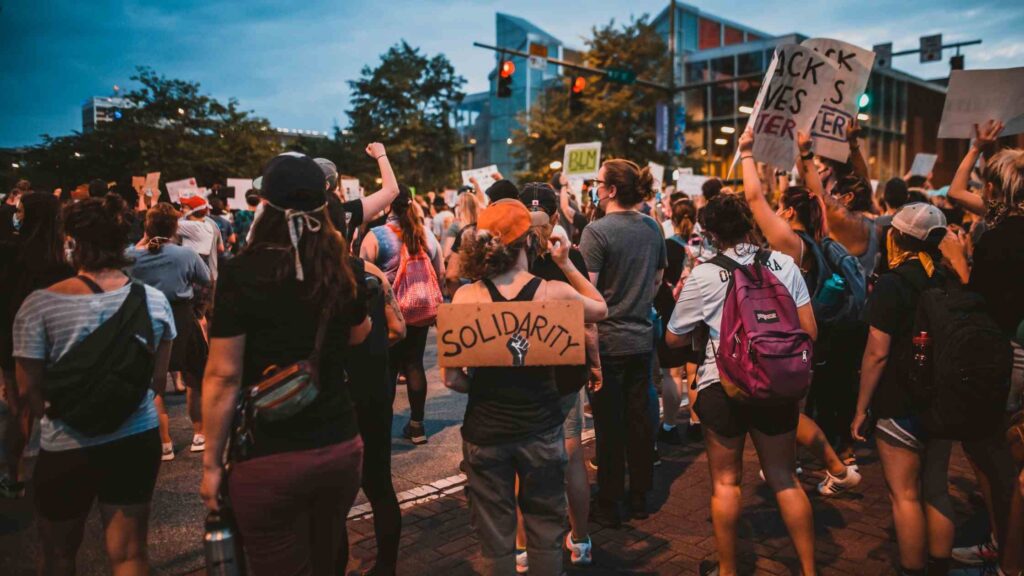A better financial world with crypto: censorship

In this blog, Elise discusses whether a better financial world is possible with crypto.
By Elise
I believe in a better financial world with crypto
Financial censorship: using financial resources to exclude or punish someone. A large portion of financial transactions go through banks. This makes it relatively easy to cut off individual people’s access, freeze accounts or even completely block the transaction system (e.g. SWIFT) for an entire country. Bank accounts are divested because people have different opinions, because they support the opposition or because they stand up for minorities. Examples of financial censorship where crypto transactions were an opportunity to still send money are many.
Nigeria
In October 2020, there were major protests in Nigeria against excessive police brutality by the SARS police unit, under the #EndSARS campaign. The protests grew quickly and asked for donations to cover the cost of the demonstrations. Think water, food, and medical supplies. Massive donations were made through local banks and online payment methods.
Soon one of the main organizers of the demonstrations, Feminist Coalition, noticed that transactions were slowing down. Fundraising through a donation website was also seen to be blocked. This was done to quell protests. Accepting Bitcoin kept donations possible: over €150,000 in BTC donations were received. It ended up funding 128 protests.
Wikileaks
Back in 2011, Wikileaks accepted bitcoin donations. After publishing secret and controversial documents, Wikileaks could no longer use banks and financial services. The only method of fundraising that was still possible was through bitcoin. For three years, these bitcoin donations were their primary method of fundraising. This period included the publication of documents on guantanamo bay and Syria, and Wikileaks helped Snowden escape from Hong Kong.
Canada
Following the announcement of new corona measures, trucker protests began in Canada on Jan. 22. They blocked Ottawa’s streets for 3 weeks and caused a lot of inconvenience. First the GoFundMe accounts of protest donations were blocked, then the platform GiveSendGo (where donations were also made) ran into problems with hackers. When an emergency order from the Canadian prime minister also went out, after which at least 76 bank accounts of those involved in the demonstrations were blocked, a campaign was set up to receive bitcoin donations for the truckers. 21 bitcoin was raised. Of this, 14.6 was distributed to about 90 truckers using paper wallets. The remaining 6 bitcoin was on a multi-sig wallet and was given to the Freedom Truckers Convoy.
Ukraine and Russia
The conflict in Ukraine has been going on for years, and for years charities in Ukraine have been receiving donations – partly in crypto. In 2021, the amount donated with cryptocurrencies increased by more than 900%. Because now because of the war, the SWIFT system is not working properly, the government has shared BTC and ETH addresses for donations. Trading volume on a major crypto exchange in Ukraine tripled on Feb. 24. The falling exchange rate of the national currency is a reason for this local growth, as well as the National Bank’s restriction to withdraw only a maximum of €3000 per day. Pro-Russian separatist groups have also received large amounts of crypto for their campaigns in recent years.
The flip side
This also brings us to the other side of the story. Because if the good guys can use crypto then so can the bad guys. And who actually gets to decide who the good guys are? Yes, crypto is indeed used for money laundering and in crime (comparatively only a few percent of the fiat amount laundered). Just as donations reach Ukraine, donations are also received on the Russian side.
The amount of crypto donations is often only a small fraction of the total donations received. However, the use of crypto transactions in such cases has proven that crypto is a robust system with increasing popularity. It is sometimes the only way for parties to get money when bank accounts are closed.
It is precisely because crypto is poorly regulated that you hear governments talking about the possibilities of banning the use of the censorship-resistant Bitcoin. But wouldn’t it be better to focus on stricter monitoring, on developing tools to detect fraudulent payments, rather than completely blocking this technology that contributes to freedom of speech and the right to demonstrate?
In a hearing before the U.S. Subcommittee on Oversight and Investigation, said
Van Valkenburgh
, director of research coin center
“For every transaction that we would like to see blocked, there is another transaction that we should be celebrating that is an unstoppable one”
. It is time for us as a society to think about how we see the future of our financial system.
Talk ahead in the ELFIN community about crypto, where Elise and Heleen are active and answer questions. Sign up for free here. 5000+ women went before you!





